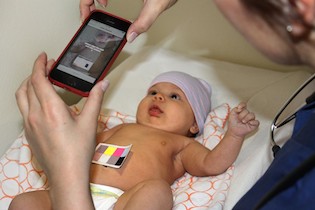 Medical and engineering researchers at the University of Washington in Seattle have developed a smartphone app, called BiliCam, that they claim can diagnose jaundice in newborns via a smartphone's camera.
Medical and engineering researchers at the University of Washington in Seattle have developed a smartphone app, called BiliCam, that they claim can diagnose jaundice in newborns via a smartphone's camera.
"The app, called BiliCam, uses a smartphone’s camera and flash and a color calibration card the size of a business card," a blog post on the university's site explains. "A parent or health care professional would download the app, place the card on her baby’s belly, then take a picture with the card in view. The card calibrates and accounts for different lighting conditions and skin tones. Data from the photo are sent to the cloud and are analyzed by machine-learning algorithms, and a report on the newborn’s bilirubin levels is sent almost instantly to the parent’s phone."
Since newborn babies' livers aren't yet fully functioning, they are not always able to quickly breakdown bilirubin, a natural byproduct of the breakdown of red blood cells. As a result their skin appears to be yellow and physicians often use the intensity of the color as a clue as to how severe the jaundice is before advising a blood test and further treatment. Untreated sever jaundice can cause brain damage or be fatal.
In a recent research paper the team explained (PDF) the need for the app:
"Accurate medical tests to assess this condition require a blood draw or the use of a specialized measuring device, making them impractical outside of medical settings. However, bilirubin levels typically peak well after most infants are discharged from the hospital. Consequently, visual assessment is the most common method to monitor jaundice in a family’s home, where clinical technology is unavailable, as well as at most outpatient clinics, where administering a blood test is logistically difficult. While parents and clinicians are usually able to visually identify the presence of jaundice, numerous studies show that even experienced healthcare providers cannot accurately estimate the severity of jaundice."
The researchers conducted a study with 100 newborns (two to five days old) at UW Medical Center to test them using a blood test, the hospitals' other noninvasive screening tool, and the BiliCam app. The concluded that, as expected, the app-based diagnostic would not replace the blood test but it could help parents know that they should take the next step and have a blood test.
Next, the team plans to test the app with 1,000 newborns, including babies of various ethnicities and skin colors. They expect to seek FDA clearance for the app sometime in the next few years and subsequently make it available for parents to use too.

















